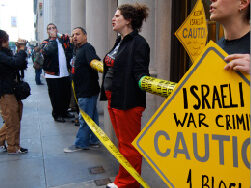On May 12, 2013 the International Jewish Anti-Zionist Network of the Twin Cities (IJAN-TC), along with several other community and solidarity organizations organized a film showing of Where Should the Birds Fly and brought Fida Qishta to Minneapolis for a discussion. The event drew about 40 people from diverse backgrounds and created a lively discussion. The film was very well received and the audience was intensely moved. There have already been discussions of future showings of the film.
IJAN-TC wishes to thank Mizna, American Muslims for Palestine (AMP), Women Against Military Madness (WAMM), Minnesota Break the Bonds Campaign (MN BBC), Milwaukee Muslim Women's Coalition, and Middle East Peace Now (MEPN) for their financial and organizational support for the event. We also want to thank Fida Qishta for her fine film and Deep Dish TV for its production.
The first film by Fida Qishta, Where Should the Birds Fly is a moving and powerful chronicle of Palestinian lives in Gaza leading up to and following the Israeli assault of 2008-2009. Coming after years of a debilitating siege, during which Israel allowed only a tiny fraction of the normal amount of goods and humanitarian aid into Gaza, denied virtually all exports, killed fishermen, farmers and school children, Operation Cast Lead killed more than 1,400 Palestinians (mostly civilians) and wounded over 5,000.
Fida Qishta had little training in photojournalism. She was a wedding videographer. But she began documenting life in Gaza, including house demolitions, the Israeli army preventing farmers from accessing their fields and fishermen from accessing fishing waters. She then filmed the 22-day assault on Gaza, using an innate skill in story-telling and interviewing. The vision one gets from watching this film is one of a people struggling, resisting and remaining steadfast.
Of those civilians killed in the assault were 23 from a single family. The Israelis had forced about 100 civilians, ranging in age from an infant to people in their eighties, into a house and then rained bombs on the house. Mona Samouni, a nine-year old girl survived while both her parents and many of her extended family were killed. Fida Qishta interviewed Mona several times as she recovered from her physical wounds. This child, intelligent and articulate far beyond her years, speaks stoically about her loss. At many opportunities she makes memorials to her parents. The viewer is overwhelmed by the intensely personal story of her loss embedded within the larger story of oppression.



